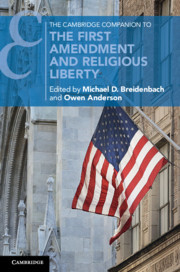Description
The Cambridge Companion to the First Amendment and Religious Liberty
Cambridge Companions to Law Series
Coordinators: Breidenbach Michael D., Anderson Owen
Offers historical, philosophical, legal, and political insights into the First Amendment, religious liberty, and church-state relations.
Language: English
Subject for The Cambridge Companion to the First Amendment and...:
The Cambridge Companion to the First Amendment and Religious Liberty
Publication date: 01-2020
474 p. · 15.3x22.8 cm · Paperback
Publication date: 01-2020
474 p. · 15.3x22.8 cm · Paperback
The Cambridge Companion to the First Amendment and Religious Liberty
Publication date: 01-2020
350 p. · 15.6x23.5 cm · Hardback
Publication date: 01-2020
350 p. · 15.6x23.5 cm · Hardback
Description
/li>Contents
/li>Biography
/li>
This book is an interdisciplinary guide to the religion clauses of the First Amendment with a focus on its philosophical foundations, historical developments, and legal and political implications. The volume begins with fundamental questions about God, the nature of belief and worship, conscience, freedom, and their intersections with law. It then traces the history of religious liberty and church-state relations in America through a diverse set of religious and non-religious voices from the seventeenth century to the most recent Supreme Court decisions. The Companion will conclude by addressing legal and political questions concerning the First Amendment and the court cases and controversies surrounding religious liberty today, including the separation of church and state, corporate religious liberty, and constitutional interpretation. This scholarly yet accessible book will introduce students and scholars alike to the main issues concerning the First Amendment and religious liberty, along with offering incisive new insights into one of the most important topics in American culture.
Introduction: assessing the First Amendment and religious liberty in America Michael D. Breidenbach and Owen Anderson; Part I. Philosophical Foundations: 1. The First Amendment and natural religion Owen Anderson; 2. The philosophical meaning of religious exercise Janice Tzuling Chik; 3. Freedom of religion: special, valuable, and qualified John Finnis; Part II. Historical Interpretations: 4. Religious exercise and establishment in early America Glenn A. Moots; 5. The historical context of the religion clauses of the First Amendment Chris Beneke; 6. Religious tests, loyalty oaths, and the ecclesiastical context of the First Amendment Michael D. Breidenbach; 7. Church and state in the nineteenth century Jonathan Den Hartog; 8. The First Amendment religion clauses in the United States Supreme Court Zoë Robinson; Part III. Law, Politics, and Economics: 9. Religious and secular presuppositions in First Amendment interpretations Paul E. Kerry; 10. Two concepts of religious liberty: the natural rights and moral autonomy approaches to the free exercise of religion Vincent Phillip Muñoz; 11. The economic origins of religious liberty Anthony Gill; 12. Corporate religious liberty and the culture wars Steven D. Smith; 13. Which original meaning of the establishment clause is the right one? Donald L. Drakeman; 14. The two separations Marc O. DeGirolami; 15. The challenge ahead: reconnecting religion, reason, and truth Gerard V. Bradley; Index.
Michael D. Breidenbach is Assistant Professor of History at Ave Maria University, Florida and Visiting Scholar at Corpus Christi College, Oxford. His work has been published in the William and Mary Quarterly, and his book on American religious liberty and church-state relations is under contract with Harvard University Press. He has been a visiting scholar at the University of Oxford and University of Cambridge.
Owen Anderson is Professor of Philosophy and Religious Studies at Arizona State University. He has published seven books, including The Natural Moral Law (Cambridge, 2012) and The Declaration of Independence and God (Cambridge, 2015). He studies rational presuppositionalism and how it approaches basic questions about God and the good.
Owen Anderson is Professor of Philosophy and Religious Studies at Arizona State University. He has published seven books, including The Natural Moral Law (Cambridge, 2012) and The Declaration of Independence and God (Cambridge, 2015). He studies rational presuppositionalism and how it approaches basic questions about God and the good.
© 2024 LAVOISIER S.A.S.

